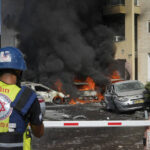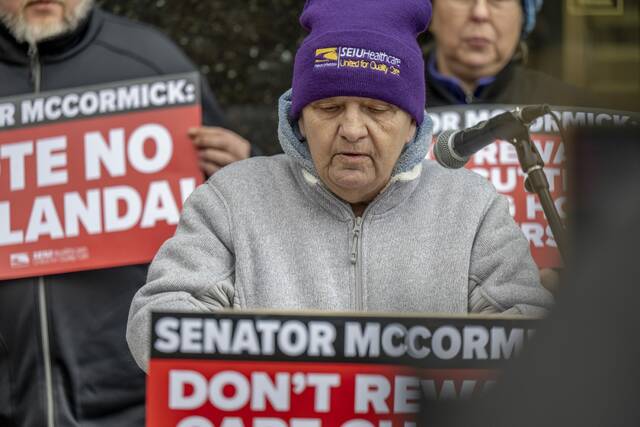Squirrel Hill native Josh Weinberg was praying in a Jerusalem-area synagogue around 10 a.m. local time Saturday when sirens alerting Israelis of incoming missile strikes started to wail.
The synagogue in the West Bank settlement of Ma’ale Adumim has no bunker, so Weinberg, a real estate attorney who left Pittsburgh in 2004, huddled on his knees with fellow congregants in the building’s main sanctuary. There, they prayed or held their breath until the wailing stopped.
Weinberg has seen many Israelis scramble for bomb shelters since his family emigrated to the Jewish State two years ago.
“This is different,” said Weinberg, 38, whose wife is 32 weeks pregnant with the couple’s fifth child. “A person I was with today, they said, ‘Everyone is going to remember where they were today.’ It’s the Yom Kippur War all over again.”
Hamas militants fired rockets and raided Israeli towns near the Gaza Strip in what some called an unprecedented surprise early-morning attack. Gunmen rolled into 22 communities outside the Gaza Strip, some as far as 15 miles from the Palestinian border.
In some villages, they roamed for hours, gunning down civilians and soldiers. Gun battles raged well after nightfall.
The attacks reminded some Israelis with Pittsburgh connections of the Yom Kippur War — a 1973 conflict where an Arab coalition led by Egypt and Syria launched a surprise attack against Israelis — but also the Sept. 11, 2001, terrorist attacks on U.S. soil.
“This scares the life out of me,” said Barbara Burstin, a Pitt professor who has authored books about Squirrel Hill’s Jewish community.
Burstin’s daughter and four grandchildren live in a small village about 20 miles east of the coastal city Haifa. Two grandsons serve in the Israeli Defense Forces, a mandatory rite of passage for all Israeli men and women after graduating from high school.
“My story is writ large — so many parents now have stories about their children being called up for war,” said Burstin, who has lived in Pittsburgh since 1974. “Israel is facing a very dire situation, and it’s very scary at this point. I hope there’s not an invasion of Gaza because it will only cause many casualties on both sides.”
Related stories
• 5 things to know about Hamas' unprecedented attack on Israel• Hamas surprise attack out of Gaza stuns Israel and leaves hundreds dead in fighting, retaliation
Jeff Finkelstein, CEO of the Jewish Federation of Greater Pittsburgh for 19 years, heard about the conflict when he woke up and checked email on his cellphone.
Though Finkelstein likes to avoid working on Saturdays, the Jewish Sabbath, he has been nervously checking his phone first thing every morning since the Oct. 27, 2018, synagogue shooting in Squirrel Hill.
“Right now, what we’re trying to get launched is a fundraising effort for the people of Israel,” Finkelstein said.
“When anything horrible happens — and I think this is an extreme example — people here in Pittsburgh want to do something; they want to help,” he said. “All Israelis are under attack. It doesn’t matter their religion. It doesn’t matter their background. This (fundraiser) is for the people of Israel.”
To donate, go to www.jfeds.org/israelfund2023.
The Jewish Federation of Greater Pittsburgh issued a formal statement Saturday saying the Oakland-based nonprofit “unequivocally condemns this terrorist attack.”
“As a community all too familiar with terrorism, our hearts and prayers are with the families who lost loved ones, those who were the victims of terrorism, and the nearly 10 million people facing unprovoked, violent attacks by sea, air and land,” the statement said. “We stand in solidarity with the people of Israel and express our unwavering support for their right to defend themselves against these heinous attacks.”
On Saturday in Squirrel Hill, Pittsburgh’s center of Jewish life, Shaare Torah congregants were leaving morning services, trying to understand what was unfolding in Israel without checking their phones, which many Orthodox Jews believe is forbidden on the Sabbath.
Congregant Jonathan Jablow said he was praying for Israel, including American friends he has there.
“It’s sad,” said Jablow, 50, of Squirrel Hill. “It’s just like Ukraine. It’s a very unfortunate situation. We pray it would go away. It’s why we go to shul, to pray that things like this don’t happen.”
Rabbi Eliezer Shusterman of Shaare Torah worked to incorporate a memorial service into the morning service. Chana Shusterman, the associate rabbi’s wife, said Saturday’s attack reminded her of the 2018 synagogue shooting here.
“Just like today, people were being killed because they are Jewish,” she said. “In 2018, we could only sit and wonder what was going on and why it was happening. That’s what today feels like.”
Back in Israel, after the sun set around 6:15 p.m. local time — 10:15 a.m. in Pittsburgh — many braced for the worst.
Ori Lenkinski was born in Canada but grew up in Philadelphia and elsewhere before moving to Israel in 2007. The professional dancer said the approaching dark was lending “a sense of foreboding.”
“It’s getting dark here, and evening is the time when these things happen,” said Lenkinski, 42, a mother of two who ran at least twice Saturday to nearby Ruth Park to cram into a shelter with 100 to 200 neighbors.
Lenkinski last visited Pittsburgh in April, when she performed a dance piece at Congregation Beth Shalom, a Squirrel Hill synagogue, and La Roche University in the North Hills.
Lenkinski spent 700 shekels — about $180 — to see Bruno Mars perform Saturday night in Tel Aviv. The show was canceled. She planned to travel Monday to Svetvincenat, a small village on the Croatian coast, to work on a dance piece premiering this month in Jerusalem. Airlines canceled flights.
“Responding to the sirens never feels good. It’s always a little unnerving,” she said. “But the images coming up and the size of what’s going on in the south — it’s shattering.”
Finkelstein lamented the tension between his religious beliefs and his call to duty as a Jewish community leader.
He also invoked “pikuach nefesh,” a Jewish belief that many religious customs, such as not using electricity on the Sabbath, don’t need to be followed when human lives are at stake.
“I try not to work Saturdays — I work 24/6,” he said. “But it’s different when Israel’s at war.”
Staff writer Paul Guggenheimer contributed.











